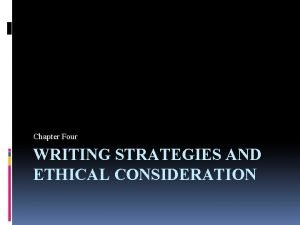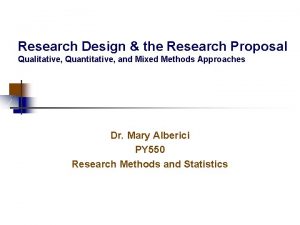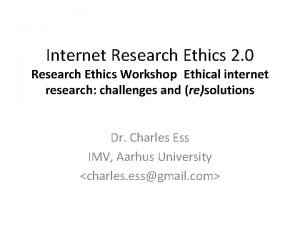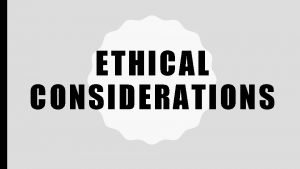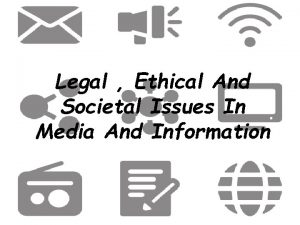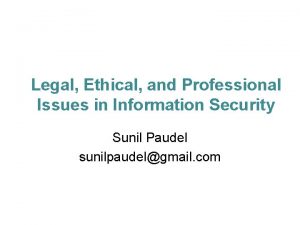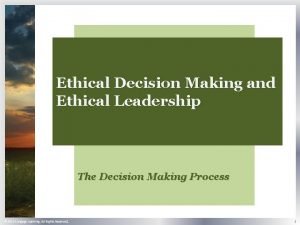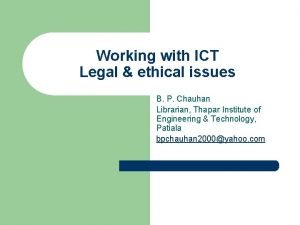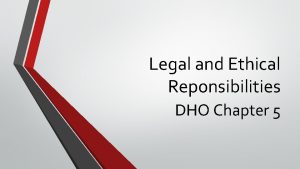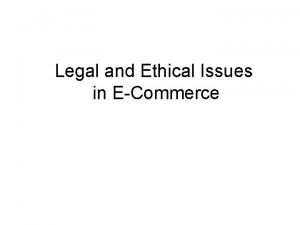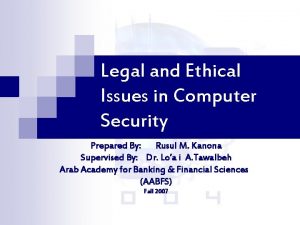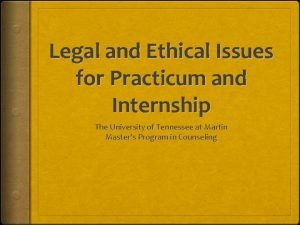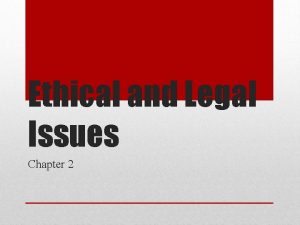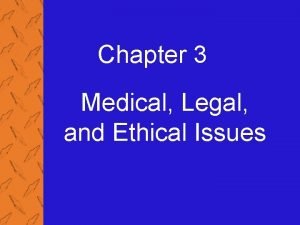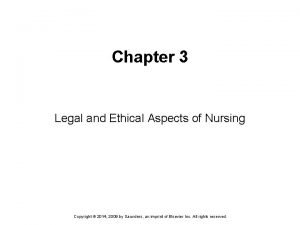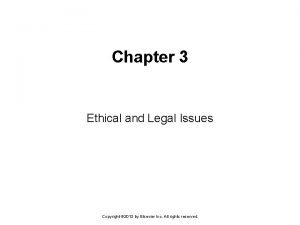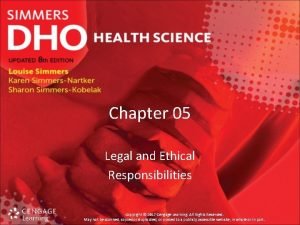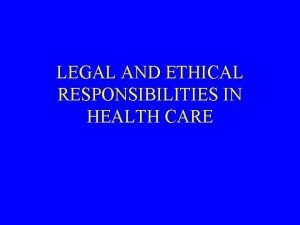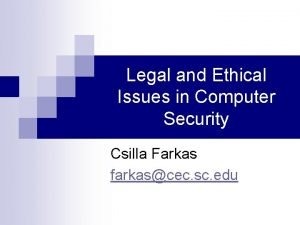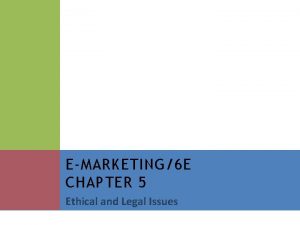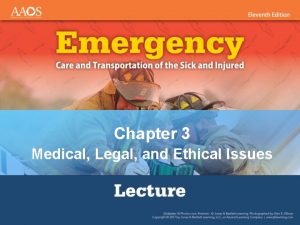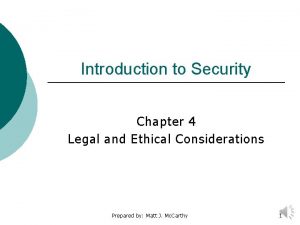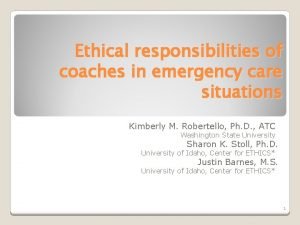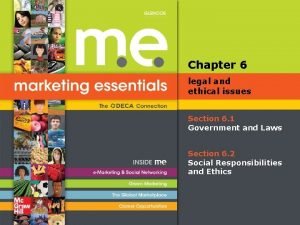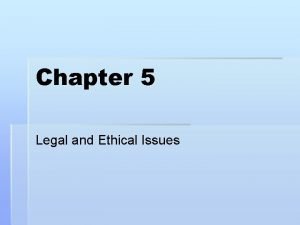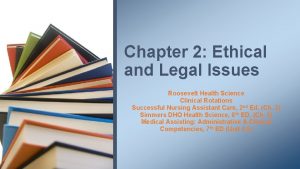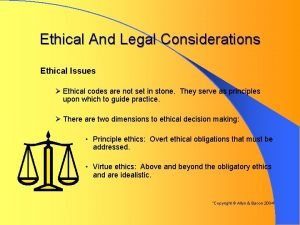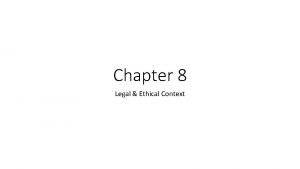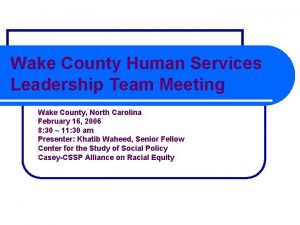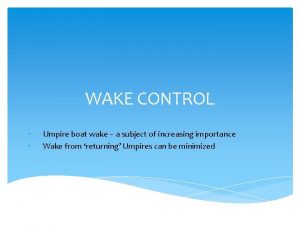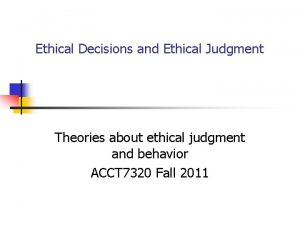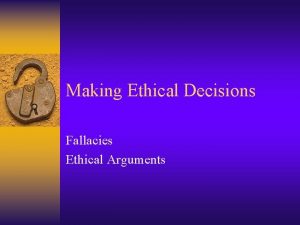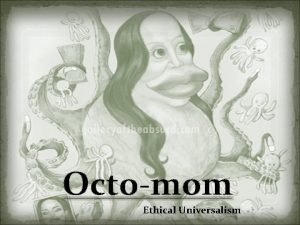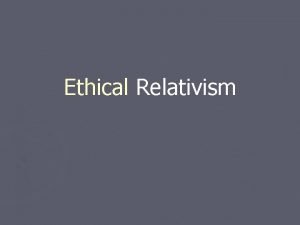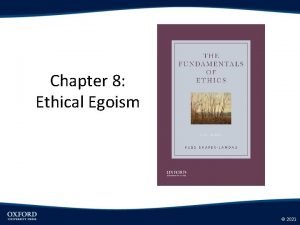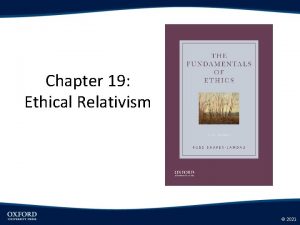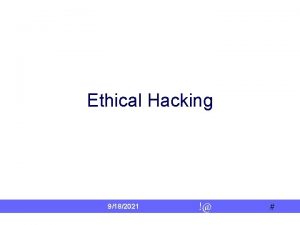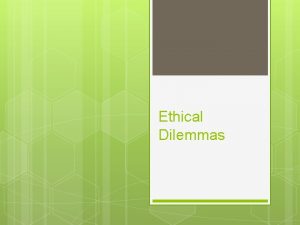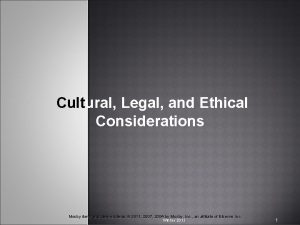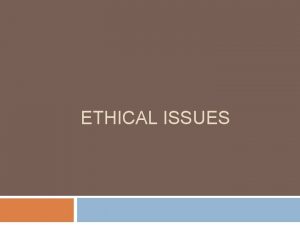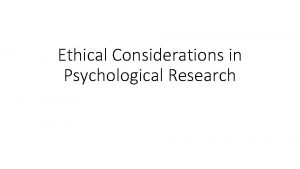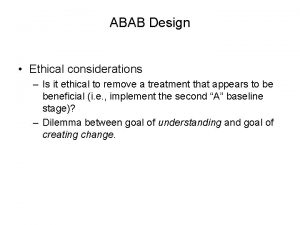Legal and Ethical Considerations in the Wake of


























- Slides: 26

Legal and Ethical Considerations in the Wake of a Major Accident ACC “Back to School” CLE Symposium August 15, 2017

The Stakes § High profile incidents continue to drive importance of crisis response and liability management § “Stakes” are higher than ever • Accidents are increasingly criminalized • Significant potential for lasting reputational harm § Rapidly unfolding events with significant legal implications pose highly unique challenges § Coordinated, well-managed response is essential 1

The Government Response § Investigating agencies • U. S. Chemical Safety Board • U. S. National Transportation Safety Board § Regulatory/enforcement agencies • Federal Occupational Safety and Health Administration • U. S. Environmental Protection Agency (civil and/or criminal) • U. S. Department of Transportation, including PHMSA • State and local environmental or safety agencies • Law enforcement 2

Specter of Criminal Prosecution § Post-incident criminal prosecutions are more common § Basis for criminal prosecution • OSH Act – “Any employer who willfully violates” any OSHA standard when “that violation cause[s] death to any employee” • Clean Air Act – Negligent and knowing endangerment • False Statements • Obstruction of Justice § DOJ Worker Endangerment Initiative 3

Role of Counsel § Major accident crisis management occurs at two levels within organization • Incident site (tactical) and corporate organization (strategic) § Role of in-house lawyer advising a crisis management team spans these levels with two primary responsibilities: • Ensuring timely compliance by company with applicable legal requirements implicated by crisis • Ensuring reasonable steps to protect company’s legal rights and interests 4

Primary Legal Issues § Evidence preservation § Internal investigations and experts § Interacting with government agencies § Document collection and production § Witness interviews 5

Evidence Preservation § Preventing claims of spoliation and obstruction are critical § Spoliation: destruction or significant and meaningful alteration of evidence § 6 • Duty to preserve evidence arises when a party “has notice that the evidence is relevant or should have known that evidence may be relevant to future litigation” (i. e. when litigation is reasonably anticipated) • Preserve documents or tangible things likely to have discoverable information that disclosing party may use to support its claims or defenses • depends on the “specific facts and circumstances, ” based on “what is reasonable” and “proportional” and “consistent with clearly established applicable standards. ” Obstruction: “Whoever knowingly alters, destroys, mutilates, conceals, covers up, falsifies, or makes a false entry in any record, document, or tangible object with the intent to impede, obstruct or influence the investigation. . ” 18 U. S. C. § 1519

Evidence Preservation (cont. ) § Spoliation can lead to monetary penalties, criminal liability, jury instruction/claim dismissal, or loss of cooperation credit/reputational damage § Considerations following a major accident include: • Change log for incident site • Preserving electronic data (e. g. , DCS, data historians) • Procedures for collecting physical evidence • Procedures for securing critical hardcopy documents (e. g. , operator checklists, control room logs, IC scribe notes) • “Preservation Order” for record retention • Ongoing duty to ensure preservation guidance is followed 7

Rule 1. 1 - Competency § To maintain the requisite knowledge and skill, a lawyer should keep abreast of changes in the law and its practice, including the benefits and risks associated with relevant technology, engage in continuing study and education and comply with all continuing legal education requirements to which the lawyer is subject. 8

Internal Investigations § Establish internal teams to conduct investigation • PSM- /RMP-mandated investigation • Privileged investigation at direction of legal counsel § Imperative to reinforce controls on both investigations • Guidelines on document preparation and retention • Limitations on collecting documents outside of formal process • Role for legal counsel on both investigations § Act as if everything that is written is discoverable 9

Experts and Internal Investigations § Protect consultants and experts • Issue of consulting vs. testifying experts • Anything given to expert who testifies is discoverable § Special considerations for non-privileged investigations • Important to have strong investigation leader who respects role of counsel • Carefully consider involvement of business partners • Pursuit of root cause should not absolve other parties of liability 10

When Is a Privileged Investigation Appropriate? § Remember the backdrop: § Attorney-Client Privilege § • Protects confidential communications between client and agents if significant purpose is receiving legal advice • Communications by agents of client at the behest of attorney during internal investigation are protected to the same extent as though conducted by the attorney • “Communications that do not involve both attorney and client are unprotected” Attorney Work Product • Protects documents/tangible things prepared in anticipation of litigation, unless: - Otherwise discoverable - Party shows substantial need for materials • 11 Factual material receives less protection than attorney opinions and mental impressions

When Is a Privileged Investigation Appropriate? § Focus on examining potential areas of liability based on non-privileged findings, providing legal advice, and evaluating potential exposure § Advantages include: • Protecting findings from discovery • Fostering increased candor during investigation § Where legal risk appears more significant, recommended approach may be “dual track” investigations • Privileged and Non-Privileged § Where legal risk is less significant, may choose to conduct a nonprivileged RCA with legal support as needed 12

Lessons for Privileged Investigations § Not seeking to duplicate the work of non-privileged investigations • § Facts are not privileged, but analysis may be § Client engagement necessary for ethical reasons and to ensure clear understanding of purpose and goals § Corrective actions may eventually be fed back into non-privileged operational process; sharing lessons learned but not analysis § Structure & Staffing • Lawyer may prepare investigation guidelines or charter making clear purpose in anticipation of litigation and for purpose of evaluating legal exposure • Team led by lawyer(s), supported by internal and consultant subject matter experts 13 “Bigger picture” issues examined by privileged team in anticipation of litigation and enforcement; more time & resources to dig deeper

Ethical Considerations § Investigation truly conducted by attorneys must include appropriate admonitions regarding legal role/responsibility • Corporate Miranda, Upjohn warnings • Attenuation of attorney involvement may reduce effectiveness of warning • Interviewers may seek to avoid confrontational language § Remember Model Rule 1. 13: Organization as a Client • “In dealing with an organization’s directors, officers, employees, members, shareholders or other constituents, a lawyer shall explain the identity of the client when the lawyer knows or reasonably should know that the organization's interests are adverse to those of the constituents with whom the lawyer is dealing. ” 14

Key Points from U. S. v. Upjohn § Communications between company counsel and employees are privileged § Privilege extends to any employee regardless of position, assuming privileged “subject matter” and employee awareness of purpose § Agents of attorneys may be protected by the privilege § Privilege belongs to the company, not the individual employee, and company may waive the privilege § Because of the risk to employees, counsel must explain to interviewees role, representation, and potential disclosure 15

Recent Case Law Regarding Privilege § Recent Court decisions offer mixed results, but reinforce challenges of single, privileged investigation § In re KBR (D. C. Cir. June 27, 2014) § 16 • Privilege upheld for legal analysis, but not for litigation hold or factual recitation • Obtaining legal advice was a primary or significant purpose of investigation • Subsequent references in litigation (e. g. , deposition notices) do not waive privilege Frickey v. Kobelco (E. D. La. Mar. 5, 2015) • Privilege denied for single investigation pursuant to company practice, with attorney participation • Failed to show legal, rather than business or technical, advice

Interacting with the Government § Single points of contact with dedicated legal support § Understanding of investigation process § Control of and access to incident site • Notice to agencies on site stabilization activities • Memorialize consents (or lack of objection) by agency § Exercise firm, but reasonable controls § Do not be afraid to say “No” - BUT • Have good reasons and recognize potential consequences 17

Document Collection and Production § Insist all document requests be in writing • Clarify any unclear document requests • Object to and negotiate overbroad document requests (e. g. , “any and all…”) § Identify main custodian § Establish process for collection, review and production § Always produce documents using cover letters • Note exceptions or limitations 18

Witness Interviews § Employees need to understand their rights and employer’s expectations • Whether to submit to interview is employee’s decision • Can have someone accompany them during interview • If interviewed - imperative to tell the truth • Other typical witness admonitions • Cautions regarding request for written statement 19

Witness Interviews (cont. ) § Use talking points to prevent mischaracterization of effort • Imperative that no one intimidate employees or improperly influence their testimony § Employees must understand that company counsel does not represent them individually • “Upjohn” admonition § Document admonitions in interview memoranda 20

Preparing for Accidents § Take a hard look at crisis management plans • Are roles and responsibilities up to date? • Have there been changes in reporting requirements? • Are appropriate outside resources (legal counsel, technical consultants) identified? • Is contact information current? § Ensure appropriate level of incident response training § Practice, practice – drills are key! 21

Preparing for Accidents (cont. ) § Consider developing more detailed resources for in-house (crisis management “toolkits”) • Reporting, inspections, interviews, document management § Toolkit does not establish procedure to be strictly followed • Circumstances of each accident and resulting legal issues are unique • Nothing can substitute for professional judgment of individual attorney(s) responding to event § Intended to assist company counsel in identifying and managing likely issues 22

Questions? 23

Scott A. Elliott 713. 270. 3436 scott. elliott@kattenlaw. com Scott Elliott is a partner in Katten’s Environmental and Workplace Safety Practices. Mr. Elliott advises a wide range of clients in the chemical and energy industries on health and safety-related matters. He concentrates his practice on process safety, internal investigations, and crisis response. Mr. Elliott has experience representing clients in connection with investigations by the Occupational Safety and Health Administration, the U. S. Environmental Protection Agency, the U. S. Chemical Safety Board, the U. S. Department of Justice, and also in enforcement matters involving the Bureau of Safety and Environmental Enforcement. Mr. Elliott is also a regular contributor to the Katten Safety Advisory Group, a safety issues and benchmarking forum designed for corporate safety managers and lawyers. Over 20 companies presently are members of the Advisory Group. 24

Katten Muchin Rosenman LLP Locations AUSTIN One Congress Plaza 111 Congress Avenue Suite 1000 Austin, TX 78701 -4073 +1. 512. 691. 4000 tel +1. 512. 691. 4001 fax HOUSTON 1301 Mc. Kinney Street Suite 3000 Houston, TX 77010 -3033 +1. 713. 270. 3400 tel +1. 713. 270. 3401 fax LOS ANGELES – CENTURY CITY 2029 Century Park East Suite 2600 Los Angeles, CA 90067 -3012 +1. 310. 788. 4400 tel +1. 310. 788. 4471 fax ORANGE COUNTY 100 Spectrum Center Drive Suite 1050 Irvine, CA 92618 -4960 +1. 714. 966. 6819 tel +1. 714. 966. 6821 fax CHARLOTTE 550 South Tryon Street Suite 2900 Charlotte, NC 28202 -4213 +1. 704. 444. 2000 tel +1. 704. 444. 2050 fax IRVING 545 East John Carpenter Freeway Suite 300 Irving, TX 75062 -3964 +1. 972. 587. 4100 tel +1. 972. 587. 4109 fax LOS ANGELES – DOWNTOWN 515 South Flower Street Suite 1000 Los Angeles, CA 90071 -2212 +1. 213. 443. 9000 tel +1. 213. 443. 9001 fax SAN FRANCISCO BAY AREA 1999 Harrison Street Suite 700 Oakland, CA 94612 -4704 +1. 415. 293. 5800 tel +1. 415. 293. 5801 fax CHICAGO 525 West Monroe Street Chicago, IL 60661 -3693 +1. 312. 902. 5200 tel +1. 312. 902. 1061 fax LONDON Paternoster House 65 St Paul’s Churchyard London EC 4 M 8 AB United Kingdom +44. 0. 20. 7776. 7620 tel +44. 0. 20. 7776. 7621 fax NEW YORK 575 Madison Avenue New York, NY 10022 -2585 +1. 212. 940. 8800 tel +1. 212. 940. 8776 fax SHANGHAI Suite 4906 Wheelock Square 1717 Nanjing Road West Shanghai 200040 P. R. China +86. 21. 6039. 3222 tel +86. 21. 6039. 3223 fax Katten refers to Katten Muchin Rosenman LLP and the affiliated partnership as explained at kattenlaw. com/disclaimer. Attorney advertising. Published as a source of information only. The material contained herein is not to be construed as legal advice or opinion. 25 WASHINGTON, DC 2900 K Street NW North Tower - Suite 200 Washington, DC 20007 -5118 +1. 202. 625. 3500 tel +1. 202. 298. 7570 fax
 Writing strategies and ethical considerations
Writing strategies and ethical considerations Quasi experimental design ethical issues
Quasi experimental design ethical issues Research paper appendices example
Research paper appendices example Ethical considerations examples
Ethical considerations examples Ethical consideration in research example
Ethical consideration in research example Media legal issues
Media legal issues Legal ethical and societal issues in media and information
Legal ethical and societal issues in media and information Ethical habits
Ethical habits Legal issues of ict in education
Legal issues of ict in education Dho chapter 5 legal and ethical responsibilities
Dho chapter 5 legal and ethical responsibilities Legal issues in ecommerce
Legal issues in ecommerce Legal and ethical issues in computer security
Legal and ethical issues in computer security Professional and ethical issues during internship
Professional and ethical issues during internship Chapter 2 ethical and legal issues
Chapter 2 ethical and legal issues Chapter 3 medical legal and ethical issues
Chapter 3 medical legal and ethical issues Legal and ethical aspects of nursing chapter 3
Legal and ethical aspects of nursing chapter 3 Chapter 3 legal and ethical issues
Chapter 3 legal and ethical issues Legal and ethical responsibilities chapter 5
Legal and ethical responsibilities chapter 5 Chapter 5 legal and ethical responsibilities answer key
Chapter 5 legal and ethical responsibilities answer key Attack sophistication vs intruder technical knowledge
Attack sophistication vs intruder technical knowledge Legal and ethical issues chapter 5
Legal and ethical issues chapter 5 Chapter 3 legal and ethical issues
Chapter 3 legal and ethical issues Chapter 4 legal and ethical responsibilities
Chapter 4 legal and ethical responsibilities Legal and ethical responsibilities of a coach
Legal and ethical responsibilities of a coach Chapter 6 legal and ethical issues
Chapter 6 legal and ethical issues Chapter 5 legal and ethical responsibilities
Chapter 5 legal and ethical responsibilities Ethical and legal issues chapter 2
Ethical and legal issues chapter 2
